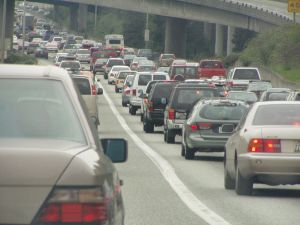A number of insurance companies and federal lawmakers are considering the idea of taxing drivers per mile of travel. This system would work kind of like toll roads. Lawmakers believe this is an excellent way to keep collecting tax dollars as they continue to lose a significant amount of tax income because of fuel-efficient cars, hybrids and electric cars, according to CNBC. These taxes go towards the reconstruction of our roadways nationwide, and that fund is dwindling.

These per-mile fees, if they take effect, would be collected via GPS navigation systems in each resident’s vehicle. There could either be a flat rate that every driver would be charged per-mile traveled or it could be altered depending on how fuel-efficient your vehicle is.
Oppositional parties have multiple problems with this technology. They believe that the GPS devices will allow the government to see where you’ve been and where you’re going, and that’s none of its business. They also believe that these mile counters could contribute to the number of car accidents in Massachusetts and elsewhere throughout the country. Motorists may be tempted to take more dangerous routes to their destination just to save a buck or two.
Our Boston car accident attorneys understand that this per-mile-fee plan is already gaining ground in the U.S. Oregon recently proposed similar legislation that would charge drivers about 0.85 cents a mile until 2015 and then jump to about $1.85 by 2018. The effort to pass this legislature and to collect more taxes per mile from drivers in Oregon has been stalled in debate. More and more states, including Minnesota and Texas, are looking into the idea, trying to make up for the diminishing tax revenue resulting from more fuel-efficient cars.
Today, cars on U.S. streets get about 25 mpg and motorists are paying about 2 cents a mile in taxes.
Roadways in Europe have become more and more crowded and local officials have become more concerned with environment-related issues in the area. For that reason, they’re also looking into charging drivers per mile to help decrease some of the fuel usage and vehicle emissions in their area. They were supposed to have instituted some sort of nationwide per-mile fuel tax by next year, but that idea was pushed aside when the new government took office last session.
A number of pilot projects that have tested out these meter systems report that one common result is that a number of drivers go on strike and park their personal cars and switch over to mass transit to avoid the tax hikes.
“The trials work well, but it’s first a psychological issue and second a political choice,” Eric-Mark Huitema who developed the system.
Advocates of the taxing system say that the GPS devices won’t keep track of where your car has specifically been.
Experts believe that this idea is here to stay. Still, J.D. Power and Associates reports that hybrid, battery-electric and plug-in vehicles will make up less than 10 percent of the entire U.S. vehicle market by 2020.
Many believe that the average mile per-gallon rating for U.S. vehicles in 2025 will be approximately 55 mph. As Americans continue to drive less as the fuel prices increase, government officials will continue to seek ways to squeeze every last tax dollar out of each one of us.
If you or a loved one has been in a car accident in the Boston area, contact Massachusetts Car Accident Attorney Jeffrey S. Glassman for a free and confidential appointment to discuss your rights. Call (617) 777-7777.
Additional Resources:
States mull taxing drivers by the mile, by Paul A. Eisenstein, CNBC
More Blog Entries:
Massachusetts Car Accidents Cost Big Bucks in Medical Costs and Lost Work Days
August 19, 2011
Another City rejects the use of Red-Light Cameras to Monitor Intersection Accidents in Massachusetts
August 3, 2011
 Boston Car Accident Lawyer Blog
Boston Car Accident Lawyer Blog

